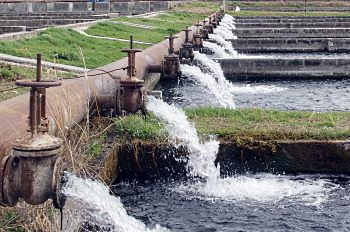property>volumetric flowrate
What is Volumetric Flowrate?

The volumetric flow rate of a system is defined as a measure of the volume of fluid passing a point in the system per unit time. The volumetric flow rate, Q, can be calculated as the product of the cross-sectional area, A, and the average flow velocity, v. The volume of fluid that flows past a given cross sectional area per second is Q = A.v. Strictly v is a vector, but in internal flows through pipes, for example, there is only one possible flow direction. The SI units for volumetric flow rate are cubic metres per second, although many other units are commonly used depending on the industry, such cubic feet per second or litres per second.
In fluid dynamics and hygrometry, the volumetric flow rate is the volume of fluid which passes through a given surface per unit time. As defined by Darcy's law, volumetric flow rate should not be confused with volumetric flux. Volumetric flux is represented by the symbol q and its SI units are m3/(m2.s) or m/s. The volumetric flow rate is given by the integration of a flux over an area. When the fluid flows in an angle θ, the volumetric flow rate Q can be calculated as:
Q = A ʋ cos θ
where A is the area of the pipe and ʋ is the uniform velocity of the fluid with an angle θ. When the fluid flow is perpendicular to the area A, the angle θ = 0. The volumetric flow rate is
Q = A ʋ cos θ
The above equation is for one-dimensional incompressible flows and it is commonly referred to as the continuity equation. If the velocity of the fluid through the area is non-planar then the volumetric flow rate must be calculated by using a surface integral.
Measuring Volumetric Flow Rate
A fluid flow meter is a device used for measuring the rate of fluid flow or volumetric flow rate. In its simplest form it is comprised of a tube, and a tapered float which rises or falls depending on the flow. The float is often designed to spin with due to the fluid flow which reduces the chance of it getting stuck at low flow rates (or at least makes it obvious if it has done so), and because of this the device is known as a rotameter. An automatic version may have a light source and a light detecting device for remote measurement. A variety of other devices exist that work on a similar principle of a variable flow area.
Many other devices have been devised for measuring volumetric flowrate. An important category is the positive displacement devices that repeatedly fill a vessel. These can be used where precise measurement is required because the fluid is being metered (e.g. for sale). Turbine flow meters have a small turbine that drives a generator to indicate the flowrate. The venturi meter uses a constriction in a pipe to provide a small amount of resistance to the flow and then uses a manometer to measure the pressure difference. Various other devices essentially measure the fluid velocity, from which the flowrate can be derived.